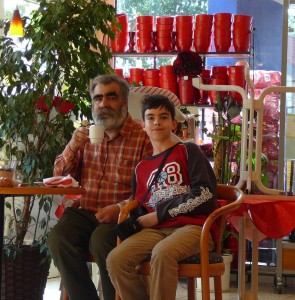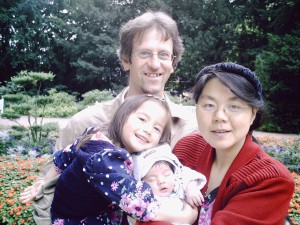Esperanto: like a native (video) Posted by Chuck Smith on Feb 21, 2015 in Uncategorized
Today, February 21, 2015 is International Mother Language Day. There are over 6,000 languages spoken on earth, a staggering amount! Would you have guessed that Esperanto is one of them?
As you might have already seen on this blog, Esperanto is a living language with native speakers, and in celebration of International Mother Language Day a multinational team put together a short video interview with six native Esperanto speakers. The video features subtitles in several languages, including English. Producer Judith Meyer, who speaks over ten languages including Esperanto, said “I wanted to show that Esperanto has managed an incredible feat: it started out as one man’s project, its death was prophesied many times over the past 125 years, but now it is a living language with a growing number of speakers all around the world.” Hear what native speakers have to say in this video below!
Native speakers: an Esperanto Secret?
Esperanto speakers sometimes want to hide the fact that there are native speakers, because the language was designed to be one’s second language, not their first. However, with people finding their love at Esperanto meetings, native speakers were only inevitable. They get married, have kids, and now which language should they speak with them? There are two different situations based on whether their parents speak the same native language or different ones. Let’s look at these scenarios.
Same Language Parents
Believe it or not, this is the most common scenario for native Esperanto speakers. However the parents met, they speak the same native language and want to give their children a richer linguistic background, so one of them speaks Esperanto all the time while the other parent speaks their national language. However, many factors play into whether the children keep responding in Esperanto or not. With no further contact with the Esperanto community, many children one day decide to stop speaking Esperanto and just speak the local language with their parents.
However, children notice the importance of Esperanto when foreign guests come to visit who don’t speak the local language. Also, some families visit Esperanto meetings abroad, so their kids experience the usefulness of Esperanto first-hand as other children they’re playing with don’t speak their native language. Studies have shown that you can show children foreign language television or read to them in another language, but the only method that seems to truly work is when a child plays in a foreign language… then the language takes hold and they start to master it.
Different Language Parents
Imagine you met your Esperanto-speaking spouse while traveling abroad and then have kids together. Most likely, you’ll naturally just speak Esperanto with each other, because this is the language you’ve used ever since you met. Now, what do you speak with your kids? Most couples decide to each speak to their children in their own native language, so this child grows up bilingually. Most decide that their child can learn Esperanto later in their life if they want, since it is much easier to learn than most languages… and with two languages already under their belt and having heard their parents speak Esperanto their whole life, learning it then becomes a breeze if they choose to do so.
Parents will usually at some point try to understand enough of their spouse’s language, so they can understand what their spouse and child are saying to each other. While this may seem strange to the majority of us who grew up in one-language households, for these families such language switching is totally normal. Now, the interesting part comes when such a child is introduced to the Esperanto community, either by a foreign guest staying a few days in their home, traveling abroad or even attending an Esperanto meeting. Most children in such situations learn to get by quite well, since they’ve heard their parents speaking Esperanto their entire life.
Visits from extended family are also interesting to throw into the mix. In such situations, most of the extended family can usually only speak one language, so during these visits this language takes priority. In any case, these children have incredibly high language and cultural awareness, which can give them many extra benefits in life as their unique perspective grants them full access to not only two national cultures, but also to the international Esperanto culture and community as is demonstrated by what we heard in the film above.
Note that I’ve tried to simplify these scenarios quite a bit, but in real-life they can be quite complex. The most interesting I’ve heard of is a French man and Hungarian woman who met through Esperanto and moved to the Netherlands. Their son grew up speaking French, Hungarian, Esperanto, Dutch and learned English in school. In any case, these children have great advantages in dealing with our multilingual international world.
Read more from Esperanto native speakers
Over the years, I’ve also interviewed a few native Esperanto speakers. I started with Rolf Fantom and his not always positive experience growing up in an Esperanto family. The next year, I interviewed DJ Leo Sakaguchi, which you can see in the above film. Then, lastly, I interviewed the third generation native Esperanto speaker Nicole, which lead to an interview with his father, Helmet Klünder!
While not a native Esperanto speaker, watch the video above to learn about a polyglot raising his daughter in five languages. Story starts at 20:45.
If you spoke Esperanto, would you raise your children speaking Esperanto? Why or why not?

Build vocabulary, practice pronunciation, and more with Transparent Language Online. Available anytime, anywhere, on any device.
About the Author: Chuck Smith
I was born in the US, but Esperanto has led me all over the world. I started teaching myself Esperanto on a whim in 2001, not knowing how it would change my life. The timing couldn’t have been better; around that same time I discovered Wikipedia in it’s very early stages and launched the Esperanto version. When I decided to backpack through Europe, I found Esperanto speakers to host me. These connections led me to the Esperanto Youth Organization in Rotterdam, where I worked for a year, using Esperanto as my primary language. Though in recent years I’ve moved on to other endeavors like iOS development, I remain deeply engrained in the Esperanto community, and love keeping you informed of the latest news. The best thing that came from learning Esperanto has been the opportunity to connect with fellow speakers around the globe, so feel free to join in the conversation with a comment! I am now the founder and CTO of the social app Amikumu.





